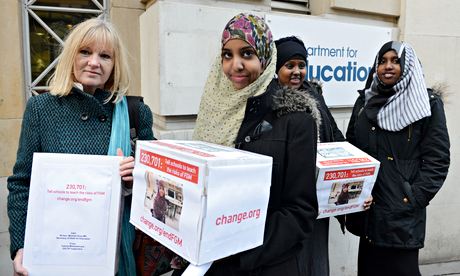
The cutting of girls at female genital mutilation "parties" is still going on in Britain and not just taking place abroad, healthcare experts have told MPs.
The Commons home affairs select committee has heard that "cutters" – often older women – are flown into Britain for the events, at which as many as a dozen girls may be operated on.
Janet Fyle, of the Royal College of Midwives, said that by the time the authorities could be alerted, the cutter would have left. "By the time the girls are cut, the woman 'cutter' is on her flight back to the country she came from. We can't go after the cutter. We don't know who she or he is. The parents have to be held responsible," she said.
Professor Janice Rymer, of the Royal College of Obstetricians and Gynaecologists, shared Fyle's belief that FGM was happening in Britain. Asked about its scale, she said: "We have no idea. We have no data but I am sure it is happening in this country."
The MPs also heard evidence that 75 to 80 women were undergoing FGM reversal operations in Britain each year.
The line of questioning by the MPs in the final evidence session of their inquiry into FGM suggested that their report is likely to recommend that healthcare professionals be placed under a new statutory duty to report cases to the police.
The health experts were asked for their response to a television and poster campaign to raise awareness of FGM, and to a requirement that any girls who faced a risk of mutilation should have it recorded in their paediatric "red book", which is issued to every child in Britain.
The MPs heard from French legal experts that statutory reporting to the police was required in France and that those responsible for mutilating girls had been jailed for up to eight years.
The first person to be charged under Britain's FGM laws appeared at the Old Bailey last week. Dr Dhanuson Dharmasena, 31, is accused of carrying out the procedure on a woman after she gave birth at Whittington hospital in Archway, north London, on 24 November 2012.
Scotland Yard has launched a campaign to prevent girls being flown abroad to be mutilated, senior officers told the select committee. They blamed the lack of prosecutions over the past 20 years on healthcare professionals for failing to report cases to the police.
However, Professor Nigel Mathers, of the Royal College of General Practitioners, said on Tuesday that police were not putting the blame in the right place.
He said it was not necessary to place a statutory duty on doctors to report cases of FGM because they were already under a statutory obligation to report cases of child abuse, and FGM was a form of this: "The difficulty is in identifying those involved," he said.
His concerns was supported by Rymer, who said that she agreed with statutory reporting in principle, but that most cases encountered by gynaecologists and obstetricians involved pregnant women in their 20s who had been cut 16 or so years before.
But she was told by the committee chair, Keith Vaz, that he had no sympathy with that position and it was for the director of public prosecutions, not healthcare professionals, to decide whether a prosecution should proceed in such circumstances.

